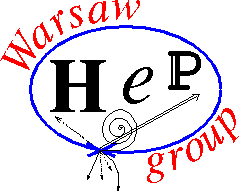SEMINARIUM FIZYKI WIELKICH ENERGII
Dnia 10 stycznia (piątek) o godzinie 11:30, w sali B2.38 odbędzie się seminarium, na którym zostanie wygłoszony referat pt.:
„High Energy Neutrinos: Recent results from IceCube”
Referuje: dr Joanna Kiryluk (Stony Brook University)
IceCube neutrino observatory is 1km3 detector located at the South Pole in Antarctica. It’s been continuously taking data, since its completion in 2010.
In 2012, IceCube detected first PeV neutrino events, the highest energy neutrinos ever observed, and measured an unexpectedly large astrophysical diffuse neutrino flux.
Since then, we characterized this flux utilizing different detection selections with: all-flavor neutrino events starting in the detector, muon neutrino induced tracks, and cascades events, dominated by electron and tau neutrino flavors. The diffuse flux was found to be well described by a single power law with a spectral index of 2.5, softer than expected.
Its origin remains largely unknown. In 2017, an IceCube neutrino alert from a direction of TXS 0506+056 triggered a multi-wavelength campaign of followup observations, and identified TXS 0506+056 as a cosmic rays accelerator and a common source of high energy neutrinos and gamma rays: a breakthrough in multi-messenger astronomy.
Since then, IceCube found evidence that astrophysical neutrinos are correlated with NG1068, PKS1424+240 and TXS0506+056 active galaxies.
In this talk we will review IceCube results on astrophysical neutrino diffuse flux and sources, as well as plans for the future.
Serdecznie zapraszamy
dr hab. Katarzyna Grzelak
prof. dr hab. Aleksander Filip Żarnecki

